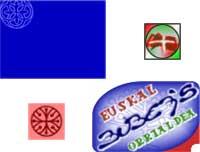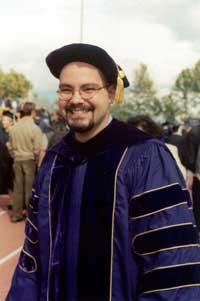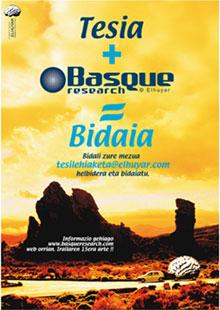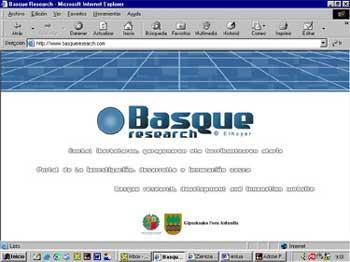Buber.net, Buber page
2001/11/15 Kortabarria Olabarria, Beñardo - Elhuyar Zientzia
We entered this last one. On the black background you can find details about the personal life of Blas Uberuaga: about him and his family, his origin, his birthplace, his youth residence... For example, on your page you can see that Blas touches the trombone, who likes beer, or who also likes baseball. Buber has also dedicated a lot of space to later studies and research, which can be known more in detail through his page. By keeping friends in mind when preparing the page, you can access your web pages through the Internet. All in English and Spanish.

In any case, what has made Buberri famous among Basque Internet users has not been his personal page, but the page that has filled Buber’s Basque Page, Blas Uberuaga, with the collaboration of other Internet users on the Basque Country and Basque themes.
White, green and red dominate the Buber´s Basque Page, a symbolism that needs no explanation. He uses Basque, English, French and Spanish, in some documents the four languages, in other two and, according to the original, in many others.
The contents of the web are:
- Observations: Thank you to those who have helped you in the elaboration of the page, respond to the criticisms you receive or report the news you make.
- Introduction: Introduction: Links to several pages that explain what is Euskal Herria.
- Basque language: The history of the Basque language, the ikastolas, the links with the institutions in favor of the Basque language, the Basque language course by computer, the universities, the Basque parties, the dictionaries…
- Folklore: Dances, Olentzero, lauburu, Basque names… all of them united.
- Sport: Sport: Ball, herri kirolak, local soccer teams…
- Music: Music: Txalaparta, txistu, singers, music, music, Basque music...
- Meals and drinks: Gastronomy in general, restaurants, wines, recipes, typical foods of each place…
- Places: Places: Tourist guide of the Basque Country, photos, walks, rural tourism, towns, cities…
- History: History: History of Euskal Herria, characters, ties…
- Politics: Politics: Politics: Institutions, political parties…
- Diaspora: Diaspora: Various channels, addresses… to contact the Basques living abroad
- Internet: Internet: List of web pages of Euskal Herria available in the network.
- News Information about the news collection sites of Euskal Herria, local media, satellite broadcasts, media from other places, news groups and forums…
Blas Uberuaga: "There was no information in English about Basque people on the Internet"

Blas Uberuaga is the creator of the web Buber of Internet. Buber is the most visited web page with Basque themes on the web. He has recently visited Euskal Herria, Munitibar. He has had the opportunity to be with his family and to be with several internet users who until now only knew by email. He also made us a hollow.
- He was one of the first to fill a website on the Internet with Basque themes. How did you think of it?
I started the page at the end of 1994. He was doing his doctorate in Seattle, the University of Washington. I had a scholarship and I was fortunate not to have to give classes. So I had a little free time. At that time the Internet was becoming famous and I decided to learn HTML and enter that world. I thought the best way to learn was to start making a page, but I didn't want to do anything, I wanted to do something new and different. Then on the Internet there were no pages about Basque, and as I had been a few years before learning a little Basque in Donostia, the notes of then came to me well to start making the page. It seemed appropriate to me and, without more, I started.
- Is it not too much work for a single person, as you have Bubernet?

From where you look. Now I don't do much, occasionally I just add some links and articles. However, most of the information that appears on the page is not what I have written, but what people have sent. All over the world, here and there, there are Basques who send me a lot of information about the region in which they live. For example, on the page there are a series of articles about Argentina and the history of the Basques, sent by some of them, and I have also received some articles from the Basque-L e-mail list. By this I mean that work is not as big as it seems; I don't write too much, I put things that people send me. The most important work is to answer questions about information about Basques that cannot be found on the Internet.
- Who visit you? Where? With what spirit?…
I have about 800 visitors a day. Where are they from? Now I don't pay much attention, but before 11% came from Spain, 41% from the United States, just over 2% from Argentina, almost 2% from England, and like other countries like France, Canada or Mexico, the rest are made up of countries around the world.
- Therefore, your page is a success. Why?
I think the reasons can be two. Mine was one of the first pages of Basque culture, so having many years, as I have been able to fill with content little by little, has more information than the rest. It is written in English. Most people who access the Internet, at least before, come from the United States and only speak English. In addition, very little has been written in English and written about Basque culture, I think that is why it is succeeding.
- You want to be a totally apolitical website, is it possible?

No, I don't think it's totally possible. Despite everything said about Euskal Herria, you enter politics. For example, if you say they are seven provinces, you have already entered, because someone tells you they are three, that Navarre is not Euskal Herria, etc. I also pick them up, but in general, people tell me that I have done quite well with the intention of abandoning political issues.
Blas Uberuaga: On the Internet Euskal Herria is not easy to find, you have to look for it.
- Has the Internet brought together the world or has it generated more inequalities?
I think it has joined a little. The current situation of another country is easier to know than before, you can know the cultures of the countries and also people. Yes, I think it collects more. I at least, thanks to the Internet I know more people than before, and I have been able to learn more about their countries.
- What image of Euskal Herria is offered on the Internet?
I don't know what to say. I do not see Euskal Herria as one who seeks information to do tourism. In my opinion, Euskal Herria on the Internet does not see much. You have to search to find something on the Internet about Euskal Herria. For example, on the CNN or the MSN, the most visited pages on the Internet, there is no advertising on the Basque Country.
For its part, the pages of the Basque Government are aimed at both the inhabitants of Euskal Herria and those of the outside. Therefore, if an exterior wants information about history, tourism or landscape, I don't think I can find it there.
- Taking into account the contents of Euskal Herria in the network, what level is there here?
It is not yet at a very high level. For example, I don't see many college students making pages, and it's amazing. And they have more information about Basque subjects than I do, and, in theory, they can do more than I do. But it seems they don't have access to the network, they don't have a computer… But I know people who are preparing pages with great goals and when they come out will improve the situation, at the same time I think you can do much more than you do now.
- You have just been in Euskal Herria with more personal questions. What atmosphere have you found? Has much of your previous visits changed?

I have realized that all Euskal Herria is in works. Something is being done in all peoples, that is what has caught my attention. I have spent a lot of time in Munitibar and, at least, that town is like five years ago. Like the people, I was fine. I had the opportunity to be with my family and friends and everyone well.
- You have also had the opportunity to be with internet users from here.
I have had the opportunity to know first-hand some of the ones I previously only knew by email. At the moment I have no joint projects, but at least we have exchanged ideas and we may be able to do something about subjects that are not usually found in English.
- Hey, what about when the Basque language?
I don't know, but we are thinking that my girlfriend and I will try to get a scholarship to work in Euskal Herria for a couple of years. If we do, I will go to an Euskaltegi to learn more Basque, but I still do not know if we can do it.
- How would you promote Euskal Herria in a single sentence?

For me Euskal Herria is like my house. That is, all the people have treated me as a family. I mean that in Euskal Herria I really feel at home. Although it is an advanced and modern country, it is a place where innovations do not complicate your life.
Blas Uberuaga.
- Born on January 21, 1971 in Caldwell (Idaho).
- Shortly after he moved to live in Homedale (Idaho) with his parents.
- Blas's father, Pedro, was born in Munitibar. He arrived in the United States at the age of 18 to work as a pastor. After three years of grazing he returned to Euskal Herria. But he travelled for the second time to the United States, where he met his future wife.
- Monika Ines Telleria, mother of Blas, was born in Oregon. It was his grandfather who travelled to Euskal Herria. At present the marriage has a transport company.
- He studied physics at the University of Idaho.
- After finishing the first years of his studies, he came to Euskal Herria and here he spent a year. He confesses that "it was like an explosion." Since then, he recommends to anyone who is willing to travel to Euskal Herria.
- Back to the United States he continued his physics studies until in 1994 he finished at the University of Idaho.
- That same year he traveled to Seattle, Washington, to do his doctorate.
- He now works at the National Laboratory Los Alamos, in Santa Fe. Studies are being conducted to improve the characteristics of semiconductors.
Diaspora Diaspora Diaspora

Do you want to know what the Basques are doing all over the world? The following addresses will be essential:
www.naboinc.com, North American Basque Organizations, page of the Basque centers of the United States. It has links with each of them. http://euskalherria.cjb.net , Basque diaspora debate forum. www1.euskadi.net/e_etxeak/indice_c.asp, Basque Government website, information about Basque centres around the world.
Published in section D2 of Deia.

Gai honi buruzko eduki gehiago
Elhuyarrek garatutako teknologia





